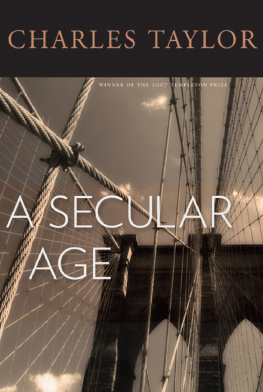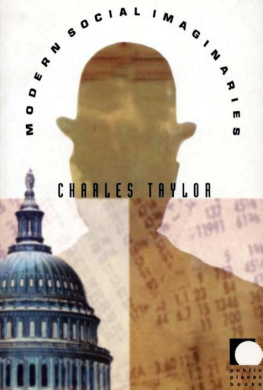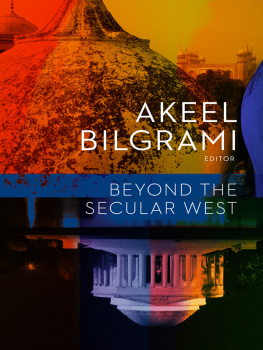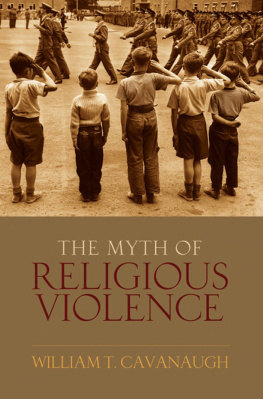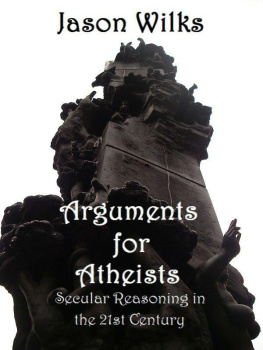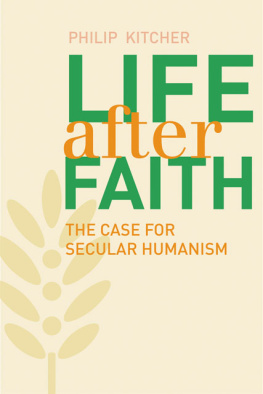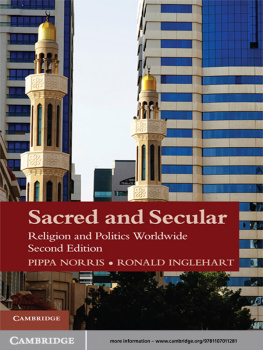
a s e c u l a r ag e
A Secular Age
charles taylor
The Belknap Press of Harvard University Press
Cambridge, Massachusetts, and London, England 2007
Copyright 2007 by Charles Taylor
All rights reserved
Printed in the United States of America
Design by Annamarie McMahon Why
Poems by Robinson Jeffers are quoted from The Collected Poetry of Robinson Jeffers, ed. Tim Hunt (Stanford University Press, 2001). Copyright 1927, 1955 by Robinson Jeffers; copyright Jeffers Literary Properties. All rights reserved. Used with the permission of Stanford University Press. Rock and Hawk, copyright 1934 and renewed 1962 by Donnan Jeffers and Garth Jeffers, is quoted from Selected Poetry of Robinson Jeffers by Robinson Jeffers. Used by permission of Random House, Inc.
Library of Congress Cataloging-in-Publication Data Taylor, Charles, 1931
A secular age / Charles Taylor.
p. cm.
Includes bibliographical references and index.
ISBN-13: 978-0-674-02676-6 (alk. paper)
ISBN-10: 0-674-02676-4 (alk. paper)
1. Secularism.
2. Religion and culture.
I. Title.
BL2747.8.T39 2007
211.6dc22
2007008005
To my daughter Gretta
Contents
Preface
ix
Introduction
1
part i
The Work of Reform
1 The Bulwarks of Belief
25
2 The Rise of the Disciplinary Society
90
3 The Great Disembedding
146
4 Modern Social Imaginaries
159
5 The Spectre of Idealism
212
part ii
The Turning Point
6 Providential Deism
221
7 The Impersonal Order
270
part iii
The Nova Effect
8 The Malaises of Modernity
299
9 The Dark Abyss of Time
322
10 The Expanding Universe of Unbelief
352
11 Nineteenth-Century Trajectories
377
part iv
Narratives of Secularization
12 The Age of Mobilization
423
13 The Age of Authenticity
473
14 Religion Today
505
viii
c o n t e n ts
part v
Conditions of Belief
15 The Immanent Frame
539
16 Cross Pressures
594
17 Dilemmas 1
618
18 Dilemmas 2
676
19 Unquiet Frontiers of Modernity
711
20 Conversions
728
Epilogue: The Many Stories
773
Notes
779
Index
853
Preface
This book emerges from my Gifford Lectures at Edinburgh in the spring of 1999, entitled Living in a Secular Age?. Its been quite some time since then, and in fact the scope of the work has expanded. Basically, the lectures of 1999 covered Parts I
III of the present book, and Parts IV and V deal with matters I wanted to discuss then, but lacked the time and competence to treat properly. (I hope the passing years have helped in this regard.)
The book has grown since 1999, and also increased its scope. But the first process hasnt kept pace with the second: The larger scope would have demanded a much bigger book than I am now offering to the reader. I am telling a story, that of what we usually call secularization in the modern West. And in doing so, I am trying to clarify what this process, often invoked, but still not very clear, amounts to. To do this properly, I should have had to tell a denser and more continuous story, something I have neither the time nor the competence to do.
I ask the reader who picks up this book not to think of it as a continuous story-and-argument, but rather as a set of interlocking essays, which shed light on each other, and offer a context of relevance for each other. I hope the general thrust of my thesis will emerge from this sketchy treatment, and will suggest to others further ways of developing, applying, modifying, and transposing the argument.
I want to thank the Gifford Lectures Committee at Edinburgh for giving me the initial impetus to start on this project. I also owe a debt of gratitude to the Canada Council for an Isaac Killam Fellowship during 19961998, which allowed me to get started; and to the Social Science and Humanities Research Council of Canada for their Gold Medal Award of 2003. I benefited greatly from visits to the Institut fr die Wissenschaften vom Menschen in Vienna in 2000 and 2001. The Wissenschaftskolleg zu Berlin gave me a fellowship in 20052006 that allowed me to complete the project in the best possible conditions, including discussions with Jos Casanova and Hans Joas, who have been working on parallel projects.
x
p re fac e
I must also express my gratitude to the members of the network around the Centre for Transcultural Studies. Some of the key concepts I use in this work have emerged during our exchanges.
In producing the book, I was greatly helped by Bryan Smyth, who made or discovered many of the translations as well as preparing the index. Unmarked translations are almost always by him, occasionally modified by myself.
a s e c u l a r ag e
Introduction
1
What does it mean to say that we live in a secular age? Almost everyone would agree that in some sense we do: I mean the we who live in the West, or perhaps Northwest, or otherwise put, the North Atlantic worldalthough secularity extends also partially, and in different ways, beyond this world. And the judgment of secularity seems hard to resist when we compare these societies with anything else in human history: that is, with almost all other contemporary societies (e.g., Islamic countries, India, Africa), on one hand; and with the rest of human history, Atlantic or otherwise, on the other.
But its not so clear in what this secularity consists. There are two big candidates for its characterizationor perhaps, better, families of candidate. The first concentrates on the common institutions and practicesmost obviously, but not only, the state. The difference would then consist in this, that whereas the political organization of all pre-modern societies was in some way connected to, based on, guaranteed by some faith in, or adherence to God, or some notion of ultimate reality, the modern Western state is free from this connection. Churches are now separate from political structures (with a couple of exceptions, in Britain and the Scandinavian countries, which are so low-key and undemanding as not really to constitute exceptions). Religion or its absence is largely a private matter. The political society is seen as that of believers (of all stripes) and non-believers alike.1
Put in another way, in our secular societies, you can engage fully in politics without ever encountering God, that is, coming to a point where the crucial importance of the God of Abraham for this whole enterprise is brought home forcefully and unmistakably. The few moments of vestigial ritual or prayer barely constitute such an encounter today, but this would have been inescapable in earlier centuries in Christendom.
This way of putting it allows us to see that more than the state is involved in this change. If we go back a few centuries in our civilization, we see that God was pres
a s e c u l a r ag e
ent in the above sense in a whole host of social practicesnot just the politicaland at all levels of society: for instance, when the functioning mode of local government was the parish, and the parish was still primarily a community of prayer; or when guilds maintained a ritual life that was more than pro forma; or when the only modes in which the society in all its components could display itself to itself were religious feasts, like, for instance, the Corpus Christi procession. In those societies, you couldnt engage in any kind of public activity without encountering God in the above sense. But the situation is totally different today.
Next page
